


Keywords: privatization; corruption; workers; strikes;
More...
Keywords: privatization; Jugoremedija;
Problems of privatization in Serbia, in case of Jogoremedija.
More...

Keywords: Montera; Trudbenik; Protest
More...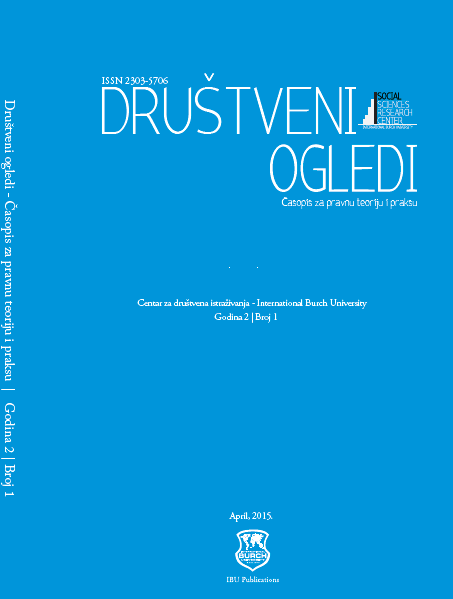
Keywords: Consumer protection; harmonization; Directive 2011/83/EU;
In the area of European contract law legal area most affected by the process of harmonization, and consequently the process of revision is the area of consumer protection. Because in the last few decades most intense legislative activity is manifested in the adoption of consumer directives. Transposing consumer directives member states have recognized the opportunity of their own economic development, since the improvement of trade is only possible if consumers enjoy the same rights no matter where in the territory of the European Union conclude contracts . This paper is focused on new horizontal instrument of European consumer law, Directive 2011/83/EU on consumer rights. Directive 2011/83/EU is a pioneering step towards building a coherent European consumer protection law, and in this light will be indicated the problem questions that arise in the process of harmonization of regulation Member States with Directive 2011/83/EU, keeping in mind the maximum harmonization clause. Also critically will be considered the process of harmonization of positive legislation with the Acquis in the field of consumer protection.
More...Keywords: locatio conductio operis faciendi; Letting and Hiring of Work; locatio conductio horrei; Lex Rhodia de iactu; Roman Law; Legal History;
Most of European private law institutes find their origins in Roman law. This is the consequence of both scarcity of older legal system’s sources and the fact that for the first time in history Romans created one relatively rounded, complete legal system, much like what we have today. However, Roman contract locatio conductio operis faciendi, which is referred as the precursor of letting and hiring of work, presents a different example. It incorporates (in part) modern day contract of letting and hiring of work, as well as several other contractual relations, which makes it very complex. In this paper, the author analyzes locatio conductio opens faciendi in classical Roman law (with reference to the Justinian law), special types of this contract, and the possibility that within its subcontract locatio conductio horrei it included contract of interest bearing deposit. This specific institute of Roman legal history provides good insight into the Roman understanding of certain types of work and the evolution of these concepts in Roman history. It also explains how the foundation of what we today call contract of letting and hiring of work originated and evolved.
More...Keywords: European Union; Lisbon Treaty; reform; legal system; European institutions; democracy;
The paper deals with the Treaty signed at the European Council conference in Lisbon on 13th of December 2007. This reform Treaty, representing the consensus of twenty seven member states, introduces modifications both to the Treaty on European Union and the Treaty establishing the European Community. The solutions proposed by the Lisbon Treaty are mostly taken from the Treaty establishing a Constitution for Europe. After introductory notes with regard to the ratification procedures adopted by each member state, the author analyses the reasons for the EU reform. During the last decade, the European Union is facing challenges such as: enlargement of the European Union, democratization of the functioning of EU institutions and strengthening of the EU external position. In the first part of the paper, the author analyses the articles of the Lisbon Treaty devoted to the adjustment of the institutional functioning to the EU enlargement such as: distribution of electoral mandates in EU Parliament, composition of EU Commission and new voting rule at the Council of Ministers to facilitate the decision making. The second part of the paper is dedicated to the democratization of European Union which should be reached by strengthening of the role played by the European Parliament, raising the transparence of the functioning of the institutions, increasing the role of the national parliaments and creating the right of citizens’ initiative. In the third part the author analyses the clauses of the Lisbon Treaty related to the strengthening of EU external position which would be achieved by creating the post of High representative of the Union for Foreign Affairs and Security Policy who becomes also the Commission’s Vice-President, providing EU with a legal status and progressing towards a European Defence Policy. Within the concluding observations, the author sums up presented observations and especially emphasizes the importance of the EU reform in order to adapt the EU functioning to the modified circumstances on the internal and international level as well.
More...Keywords: Act on the Protection of Users of Financial Services; Directive 2008/48/EC; consumer; financial services; consumer credit
U posljednje vrijeme svjedoci smo da se, gotovo pa svakodnevno, na financijskom tržištu plasira nova usluga koja se različitim (često i agresivnim) metodama i kanalima oglašavanja nastoji što prije predstaviti korisnicima i tako učiniti sastavnim dijelom njihovih života. To dokazuje da je financijsko tržište veoma inovativno i raščlanjeno, ali istovremeno i konkurentno, kako u pogledu veće raspoloživosti financijskih proizvoda tako i po broju samih davatelja. Ekspanzija financijskih usluga donosi mnoge prednosti korisnicima (dostupnost u svako vrijeme i na svakom mjestu, niže cijene usluga, paketi usluga „skrojeni“ po mjeri potreba korisnika i sl.), ali i prikrivene opasnosti jer financijski proizvodi su sve složeniji što zahtijeva visok stupanj financijske pismenosti korisnika. U fokusu pažnje jeste zaštita korisnika potrošačkih kredita s obzirom na to da je to jedna od najčešćih financijskih usluga kojoj potrošači pristupaju, a imajući u vidu novo pravno uređenje u BiH Zakon o zaštiti korisnika financijskih usluga FBiH iz 2014. godine, donesen po uzoru na Direktivu 2008/48/EZ o ugovorima o potrošačkom kreditu. U radu će se analizirati najvažniji instrumenti zaštite koji stoje na raspolaganju korisnicima kredita i pokušat će se dati odgovor koliko ovaj zakon zaista može popraviti, ali i unaprijediti socio-ekonomski status potrošača.
More...Keywords: language corpora; extralinguistic context; extended term–embedding collocation; collocations; legal contracts;
Extended units of meaning (Sinclair 2004) have been scarcely investigated thus far in legal phraseology with the exception of research into lexical bundles (Goźdź–Roszkowski 2006, 2011; Kopaczyk 2013; Breeze 2013; Tománkóva 2016; Biel 2017). This paper is therefore an attempt to show that the Sinclairian wider–context–perspective may prove to be especially useful for the study of phraseological units in legal genre since it helps us to reveal their collocational framework, allowing both grammatical and phraseological patterns to emerge. The paper focuses on extended ‘term–embedding collocations’ (Biel 2014b) extracted from the English and Croatian comparable corpora of contracts by means of WordsmithTools 6.0 (Scott 2012). It highlights some of the most striking examples supporting the above hypothesis and it accounts for their interpretation by means of analysing the extralinguistic context of phraseological units in contracts. It may be suggested that this study represents an attempt to fill a gap in research on legal phraseology due to the fact that private legal documents tend to be largely underrepresented in this specialized phraseology. It may also be suggested that by focusing on extended units of meaning in legal Croatian the paper attempts to fill yet another gap in corpus–based studies of legal language, which tend to be largely Anglocentric. Finally, the paper may, apart from revealing the stability of legal phrasemes, also represent a useful resource for translator training since it offers the wider context of a term or an expression in contract language.
More...
Keywords: Public Administration; principles of European Administrative Law; Administrative Procedure Law Reform; one-stop shop; administrative contract; act of assurance;
The European integration process implies significant reforms in many social areas. Public administration, which will design and implement such reforms, has a key role. Administrative procedure is the most significant, basic procedure related to the work of public administration. Having in mind the necessity of modernising the rules of administrative procedure, as well as the need for its alignment with European standards, all Western Balkan countries, except for Bosnia and Herzegovina, have adopted new laws on administrative procedure. Main goals of these laws are to simplify the administrative procedure and to bring public administration closer to the citizens. Through this paper, the authors want to present the common characteristics of the administrative procedure reform in the Western Balkan region and to point out the most important novelties. Also, newly-introduced institutes are presented: administrative contract, one-stop shop and act of assurance.
More...Keywords: Contract of sale; emptio venditio; in diem addictio; provision for calling-off a sale in case that the seller will not receive and accept a better offer within a given time; Roman law;
The paper analyses in diem addictio, a provision for calling-off a sale in case that the seller will not receive and accept a better offer within a given time in Roman law. It is elaborated on a number of issues pertinent to in diem addictio, especially to the issue what constitutes a “better offer” and what obligations arise for the parties when the better offer is given. The second part of the paper discusses the possibility of including this provision in contemporary law of sales, specifically in selected legal systems – French, Austrian, German and Croatian law. It is concluded that, in addition to specific regulation of this provision in Austrian ABGB, other legal systems as well provide suitable and sufficient basis for the addition of this provision to the contract of sale, both in the form of suspensive and resolutive condition.
More...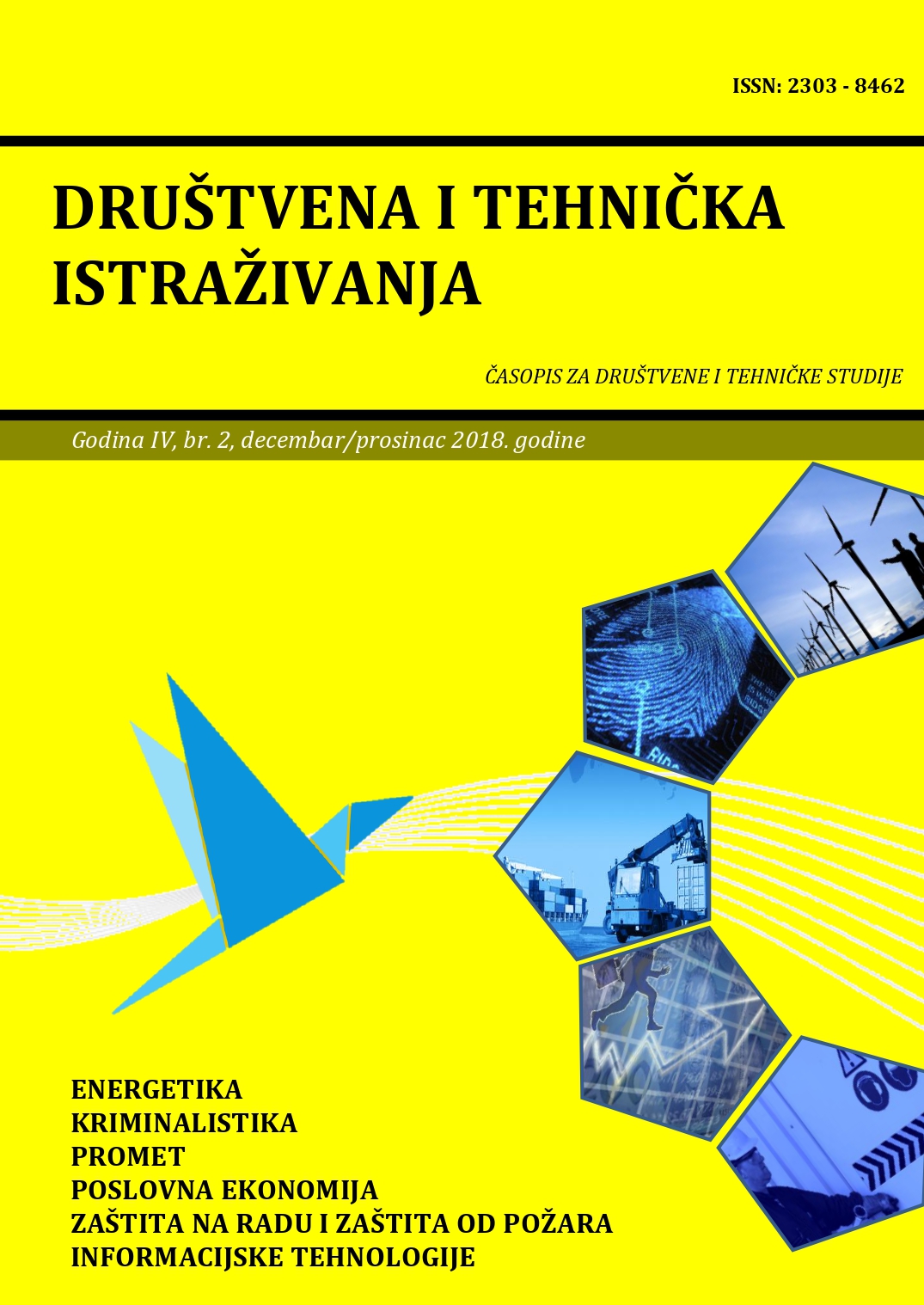
Keywords: employment relationship; flexible forms of labor; atypical employment relationship;
Social and economic changes in the world have affected many areas of life and work. One of these areas is the area of Employment Relationship, which is the central and most complex issue of the Labor law. Adjustment to the Flexible Forms of Labor, which have experienced their appearance through Atypical Employment Relationships, is special challenge. For the purpose of this paper, authors have analyzed some of the most common Atypical Employment Relationships. Some of them are already known in our legislation and practice - such as fixed-term or part-time work, while others are completely new - such as temporary agency assignment or group employment. Legal regulation of these forms of employment is more important in underdeveloped states because the lack of accuracy in this area can lead to exploitation of the workers. Market cannot independently and completely free regulate Employment Relationships and therefore State intervention in this area is necessary.
More...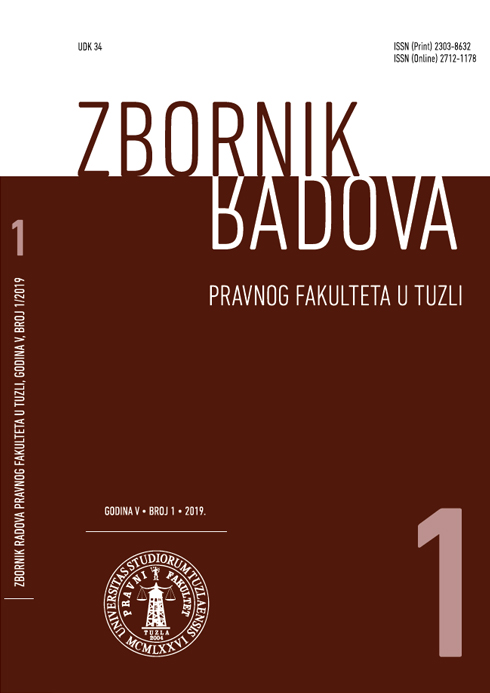
Keywords: inheritance; family law; notarial written document; the Constitutional Court of BiH Federation
On March 06, 2019, the Constitutional Court of Bosnia and Herzegovina (BiH) Federation brought the decision specifying that certain provisions of the Inheritance Law and the Family Law of BiH or the normst hat regulate the form for certain legal-inheritance and family-legal contracts are not in accordance to the Constitution of BiH Federation. The Constitutional Court of BiH Federation brought transitional arrangements thus allowing the Parliament of BiH Federation to harmonize the regulations identified as unconstitutional with the Constitution of BiH Federation within the maximum of six months from the date the decision was published in the Official Gazette of BiH Federation. The deadline determined by the Constitutional Court of BiH Federation passed on November 2019 and the Parliament of BiH Federation did not fulfillits obligations. Hence, as specified by the Court in Article 7 of the Decision, the provisions deemed unconstitutional ceased to exist. The paper analyzes the legal arrangements as the result of a failure to implement the Decision U-22/16 as well as the legal consequences of such a situation. Actually, the paper attempts to answer the question whether the legal system has the form for these legal-inheritance and family-legal affairs, and if that is the case, which form would be required for the legal affair to be valid.
More...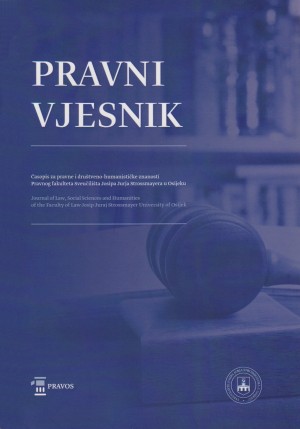
Keywords: contract; lobbying; lobbyist; contracting client; public register;
The Republic of Croatia does not have a legal framework for regulating lobbying activities. With the adoption of regulations governing lobbying, this informal activity is translated from the “grey zone” into an activity under the “watchful eye” of the competent authorities. Although there is a large amount of professional and scientific literature on the concept and activity of lobbying, it can be noticed that the academic community is much less concerned with the legal institute of lobbying contract, its classification, characteristics and content. The lobbying contract in the wider context of the Croatian science of civil law and legal practice, comprises the features of certain legal transactions, primarily a contract for services / or a mandate contract. The object of performing a lobbying contract is the execution of a lobbying activity, as a rule for a consideration, and in that sense, it represents a specific form of a contract for services. The mandate contract features found in the formation of the lobbying contract will also be emphasized. The paper aims at presenting the basic features of the lobbying contract and emphasizing certain outstanding issues that may arise in any legal regulation of this legal act in the Republic of Croatia. The comparative approach in the paper points to legal solutions applied by legal systems with a long lobbying tradition as a legitimate part of the legislative process. It also points out the plausible solutions that have emerged from the legal systems of predominantly former communist and transition countries, and which are all the more adequate to possible Croatian lobbying contract regulation.
More...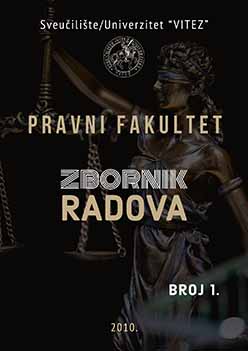
Keywords: leasing; leasing company; branch office; Bosnia and Herzegovina; entities; single market; harmonized legal system; drafting differences; legislative similarities; legislative differences;
The Laws on Leasing, passed in the Republic of Srpska in 2007 and in Federation of B&H in 2008, define leasing as the basic and sole financial activity of a corporation under strong regulatory regime of entities’ banking agencies. The examination of similarities and differences between the two Laws regulating the same business activity led to findings of their impact on: single economic space in B&H, harmonized legal system and on B&H lessees in international transactions. The most important conclusions are following. Adopting the same leasing model, the entities’ Laws continue the trend of gradual establishment of the single market in B&H. The biggest obstacles to its completion is the duty of a corporation to establish subsidiary if it wants to pursue leasing business in another entity and, consequently, double regulatory supervision. Without any visible reason, differences in drafting techniques and substantive and procedural norms are greater than on systemic level. The paper contains proposals for mitigation of damaging consequences those discrepancies produce. In this context, there is a suggestion to novel the law on IPL as to subtract international leasing contracts to BH domestic law.
More...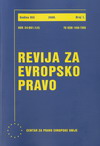
Keywords: cartel; competition law; principle of autonomy of will; the right of establishment; market participants; EU law
Regardless of certain characteristics, cartel agreements are considere as a type of civil law contracts, on formation of which applies generally accepted principle autonomy of will. The principle of autonomy of will means the freedom of choice of the counterparty and freedom of determining the content of these relationships. However, both freedom may be limited by rules of competition and cartel law. On the one hand, the participants in the cartel were not allowed concluding cartel agreements. On the other hand, some market participants may be forced to involuntarily enter into certain types of agreements in order to achieve a desirable competition. In both cases, the cartel participants on the market at the same time limited and entrepreneurship. The existence of these limits is justified by the protection of public goods or common goals and interests.
More...Keywords: social network; audit; contract; auditor; account
Social network account audit is an independent review of social network activities to express aprofessional opinion on the fulfillment of objectives, business compliance, and information security oforders on social networks. It is in principle a voluntary activity and is not subject to legal obligation likesome other types of audit such as the audit of financial statements. However, this does not diminish itsfundamental importance, which is reflected in the fact that in situations where the other party isentrusted with the management of accounts on social networks, there is a gap in expectations thatshould be mitigated by performing a professional and independent review that will result in an objectiveand professional opinion. Therefore, the issue of contracting the social network account audit is exciting,especially given the sensitivity of the data being audited and the specific status of the parameters forlogging into the account whose disposal must be subjected to strict treatment to ensure the safety ofaccount holders. The subject of this paper is the analysis of aspects of contracting the audit of orderson social networks through the analysis of contracting parties and elements of the subject of contracting. The paper's main conclusion is that auditing is a sensitive topic that should be given additional attention and focus during preliminary social network account audit activities.
More...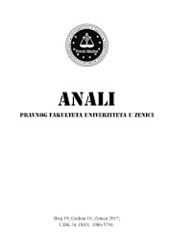
Keywords: FIDIC; employer; contractor; claims; loss of rights;
Increased importance of FIDIC Conditions of Contract on large construction project in Bosnia and Herzegovina is evident in commercial practice. A disputes between an employer and a contractor are not exception during the life of the agreement, in particular in relation to an issue of additional costs and extension of time. FIDIC introduces specific mechanism for dispute resolution and introduces loss of right (preaclusio) of a contractor if it fails to notify its claims within agreed deadlines. This article analyses validity of such loss of right from perspective of the laws of Bosnia and Herzegovina.
More...![Case - 126/97, Eco Swiss v. Benetton, [1999] ECR I-3055 ECJ](/api/image/getissuecoverimage?id=picture_2006_72914.jpg)